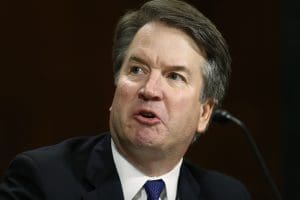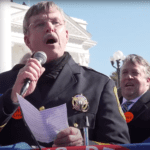Brett Kavanaugh gets a bunch of facts wrong about voting in Wisconsin
The 5-3 ruling against counting ballots not received by Election Day could disenfranchise tens of thousands of voters.

The Supreme Court on Monday night ruled that absentee ballots returned by mail in Wisconsin will not be counted if they are received after 8 p.m. on Election Day on Nov. 3, even if they are postmarked before that date. The ruling could lead to the disenfranchisement of tens of thousands of voters.
The five conservative justices appointed by Republican presidents voted in the majority. The dissenting opinion was written by Justice Elena Kagan, joined by Justice Stephen Breyer and Justice Sonia Sotomayor.
Four justices wrote explanations for their reasoning, including Brett Kavanaugh, whose concurring opinion was full of errors.
For example, Kavanaugh wrote:
To state the obvious, a State cannot conduct an election without deadlines. It follows that the right to vote is not substantially burdened by a requirement that voters “act in a timely fashion if they wish to express their views in the voting booth.” … Voters who, for example, show up to vote at midnight after the polls close on election night do not have a right to demand that the State nonetheless count their votes. Voters who submit their absentee ballots after the State’s deadline similarly do not have a right to demand that the State count their votes.
Voters who mail their ballots on time, expecting them to be received by Nov. 3, are not at fault if the United States Postal Service — which is still experiencing delays after the Donald Trump donor leading the agency made changes that slowed mail delivery — is unable to deliver them on time.
Next, Kavanaugh argued that allowing ballots to be counted if they are postmarked on time but received after Election Day could prevent states from declaring winners on election night:
Those States want to avoid the chaos and suspicions of impropriety that can ensue if thousands of absentee ballots flow in after election day and potentially flip the results of an election. And those States also want to be able to definitively announce the results of the election on election night, or as soon as possible thereafter.
This is a misrepresentation of how elections are conducted.
States do not declare winners on election night. Not a single state in the entire country has a final count by 11:59 p.m. on Election Day. Delaware, which finalizes its vote count the earliest, does so two days after the election.
Most states wait weeks to issue a certified vote total, including a number of states that don’t certify their vote counts until early December.
“What he was saying … was that late-arriving ballots could create a situation where one candidate could be ahead and then the results could flip, to which Justice Kagan replied, there is no flipping — it just takes time to count the ballots,” Rick Hasen, an elections law expert and professor of law and political science at the University of California, Irvine, told NPR on Tuesday. “The reality is that we never know an official winner on election night, and it often takes many days, even if the deadline is election night, for all the ballots to be counted, especially in a close race.”
The organizations that call winners in races on election night are media outlets. The calls are not official declarations by states.
What’s more, Wisconsin state law mandates that all ballots, including absentee ballots, not be counted until after voting is complete on Election Day, making it impossible for a final tally of balloting to be completed on election night.
“The notion the WI legislature set this ballot receipt deadline ‘to be able to definitively announce the results of the election on election night’ is nonsense,” Daniel Jacobson, a lawyer who worked in former President Barack Obama’s White House, tweeted. “The WI leg has refused to let ballots be processed before e-day, guaranteeing results won’t be known on election night.”
In arguing, “This Court has repeatedly emphasized that federal courts ordinarily should not alter state election laws in the period close to an election—a principle often referred to as the Purcell principle. … The Court’s precedents recognize a basic tenet of election law: When an election is close at hand, the rules of the road should be clear and settled,” Kavanaugh incorrectly cited Vermont as a state that this election year, despite the pandemic, “decided not to make changes to their ordinary election rules, including to the election-day deadline for receipt of absentee ballots.”
That is simply false.
Vermont did change its laws this cycle to expand voting by mail due to the COVID-19 pandemic.
Ultimately, the Supreme Court’s ruling in Democratic National Committee v. Wisconsin State Legislature could result in tens of thousands of ballots not being counted in the critical swing state.
In the Wisconsin primary, 80,000 ballots that were postmarked by Election Day but received later were counted.
In the 2016 election, Donald Trump carried the state by just 22,748 votes.
Published with permission of The American Independent Foundation.
Recommended

New NC GOP chair flirts with bogus stolen election conspiracies
Simmons predecessor was a staunch 2020 election denier
By Jesse Valentine - April 19, 2024
Texas activists pushed abortion restrictions in NM cities and counties, records show
Emails reveal influence and control in exchange for promises of legal help
By Austin Fisher, Source NM - March 04, 2024
Cannabis workers across Missouri begin push to unionize dispensaries
The first day was a breeze. Sean Shannon and Danny Foster walked into several marijuana dispensaries around Missouri with their matching “Union For Cannabis Workers” shirts and talked to employees about the possibility of unionizing. “The first day, there were 57 stops amongst the teams,” said Shannon, lead organizer with UFCW Local 655, which actually […]
By Rebecca Rivas - December 04, 2023










































































